Start Exploring Keyword Ideas
Use Serpstat to find the best keywords for your website
Google Search Operators:
Making Advanced Search Easier
Making Advanced Search Easier

But there's more: Google offers a variety of advanced tools for searching like a pro and getting the best results possible.
The most powerful option among them is Google's advanced search operators that you can apply to your query to narrow down your result set.
If you are new to using this cool Google feature, you definitely need a user-friendly cheat sheet, and this comprehensive list of Google operators is the right place to be.
What is a Search Operator?
It's a smart algorithm that includes or excludes certain search results based on your request.
Rather than going through tones of pages, you can use a more efficient approach and save up a lot of time by only focusing on the most relevant and accurate results.
Now, let's start with the basics.
Google's basic search operators
Search for the exact phrase with quotes: "example"
For instance, if you type in "backlink building tools," your SERP will only include links to pages that have the exact text phrase "backlink building tools" in the title, meta description, and body content.
This search operator is also useful if you want to search for people by name, book titles, products, quotes, etc.
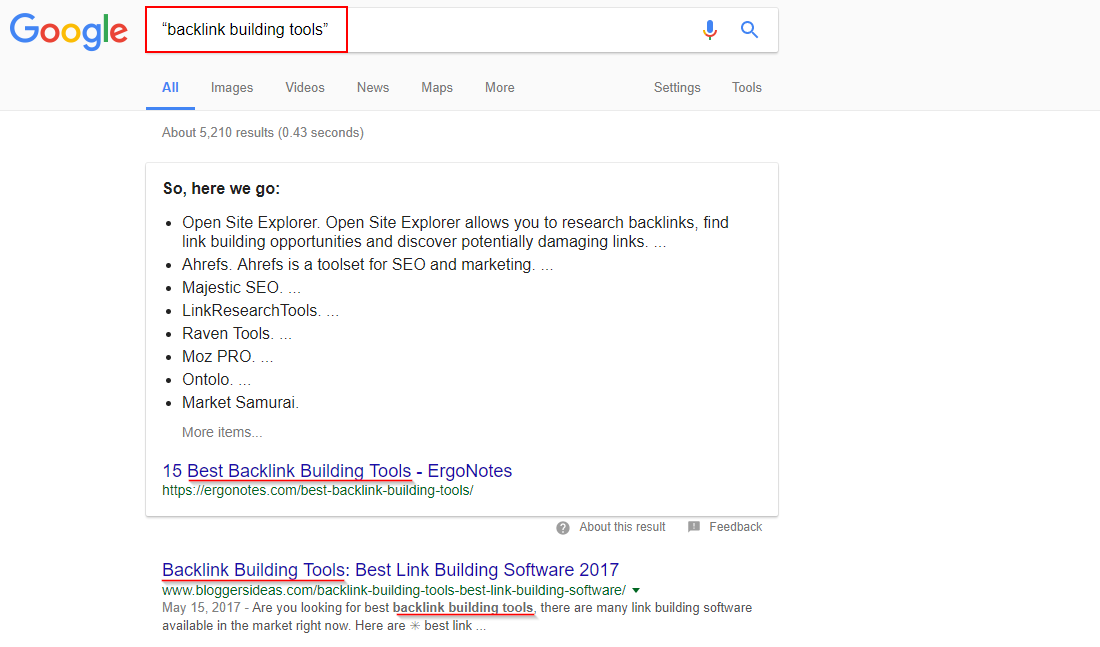
Narrow the search results with the help of minus(-) operator
Let's say you are searching for java, and you definitely do not want any pages that are related to beans or coffee. You can query using java -beans -coffee.
You can use this operator with others, for example:
- To remove pages from example.com domain, use -site:example.com;
- If you do not want any specific term in page title, use -intitle:keyword;
- If you do not want any specific term in URL, use -inurl:keyword.
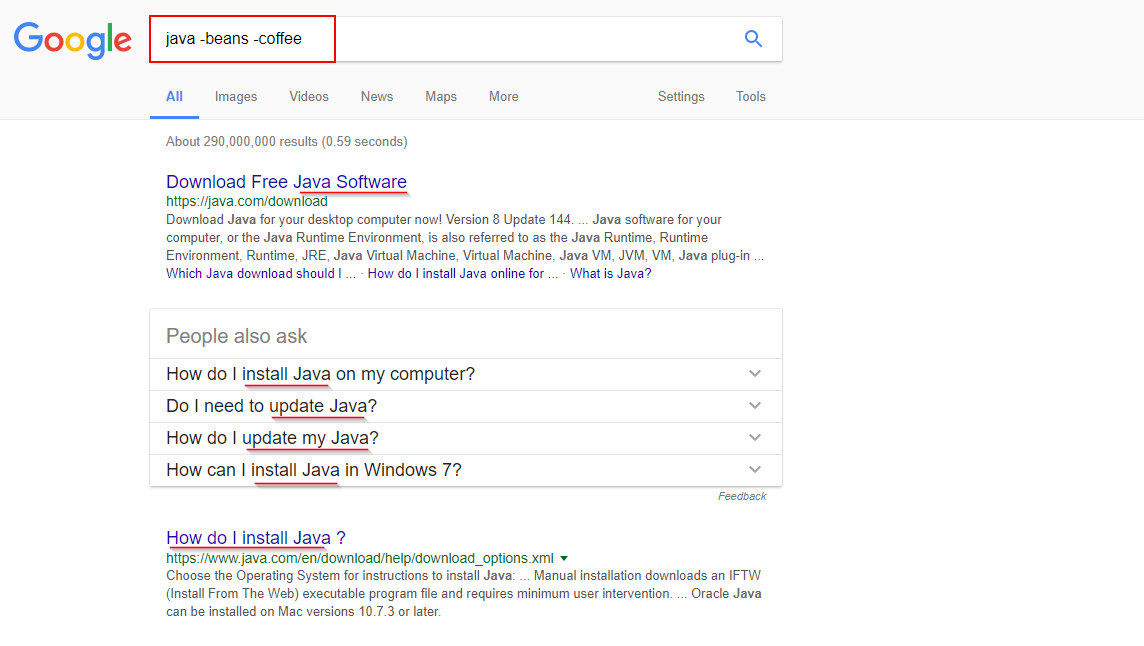
Let Google fill in the missing word(s) in your search query using * (wildcard operator)
This is helpful if you want to search for a generic phrase with slight variation.
Let's say you are searching for a search engine marketing tool and a search engine optimization tool. You can make a generic query for both these terms using (*) an operator like "search engine * tool".
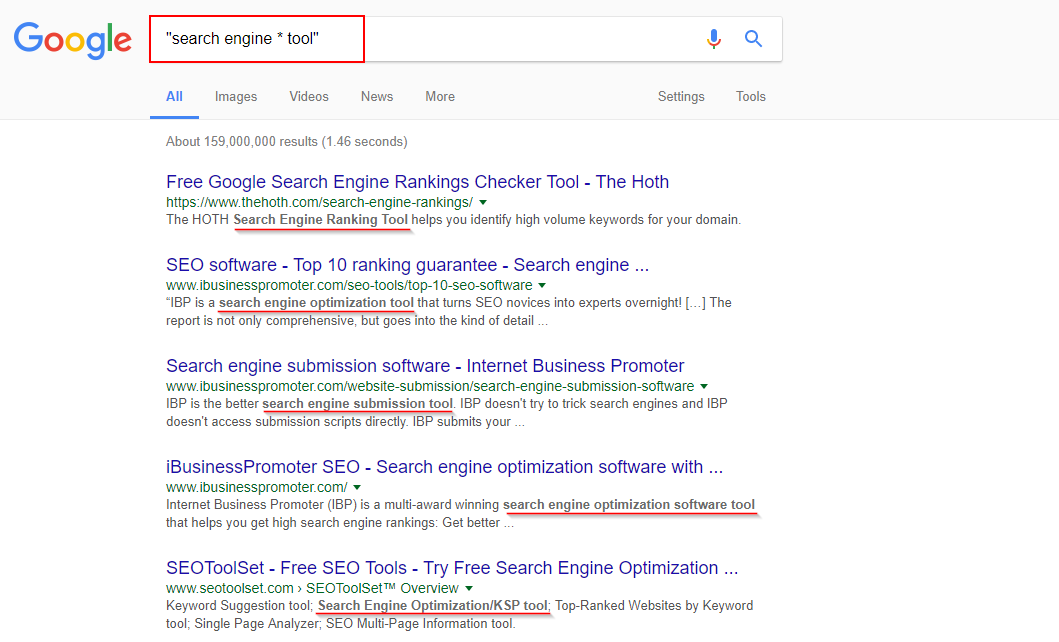
Define the number of keywords with AROUND (X)
You can reconstruct the search engine tool query we used above, using AROUND(X) operator to search engine AROUND(3) tool.
This operator is quite helpful when you have a vague idea of something, and you do not remember the exact phrase to search for.
Use .. (range operator) to search for the numbers in a range
For example, to search for Lenovo laptop with price between $900 to $1100, use query lenovo laptop $900..$1100.
You can also use this query to find listicle articles. To find an article like Top (5,6.....50) Content Marketing Tips, use a query Top 5..50 Content Marketing Tips. Or you can use this operator to define date range like 2011..2012.
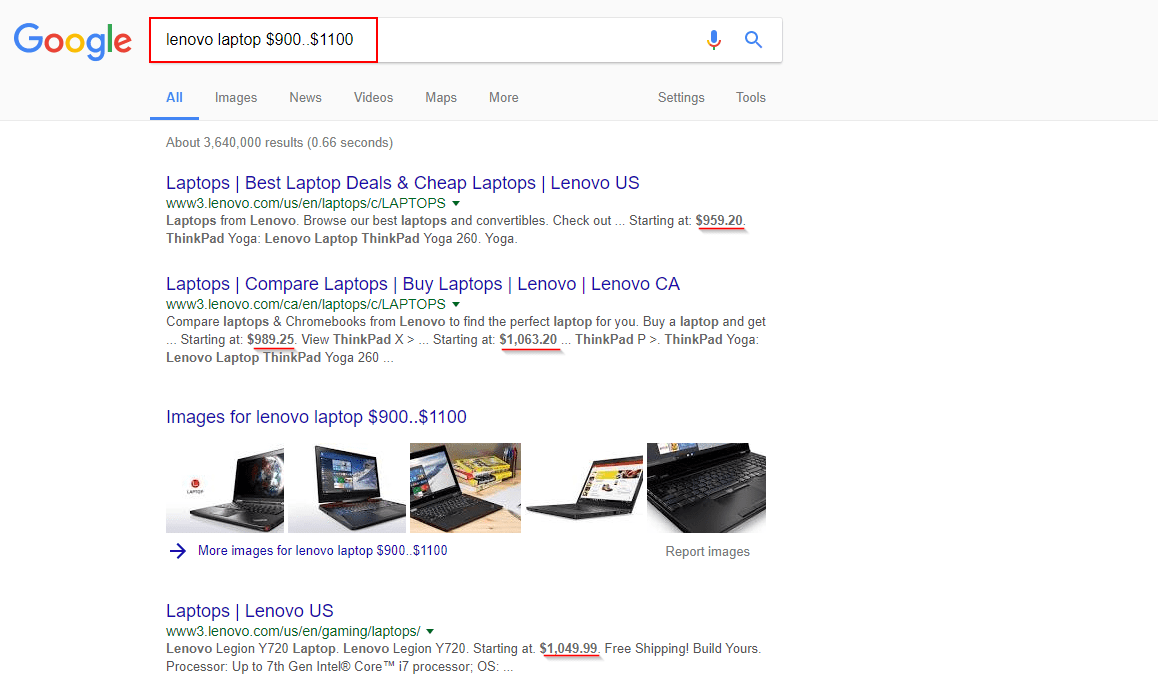
Use several complex search operators together with the help of ()
For example, to search for iPhone 7 and iPhone 7 plus in a refurbished or second-hand condition, you can use query ("iPhone 7" OR "iPhone 7 plus") AND (intext: refurbished OR intext:second-hand).
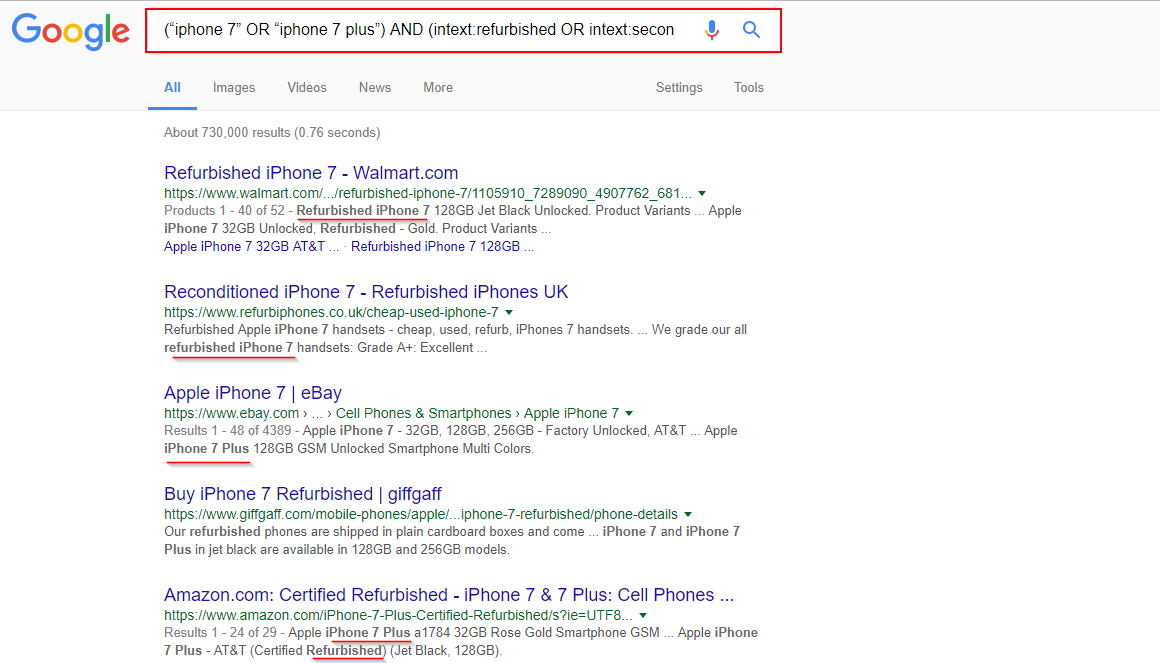
Search for prices using $ sign
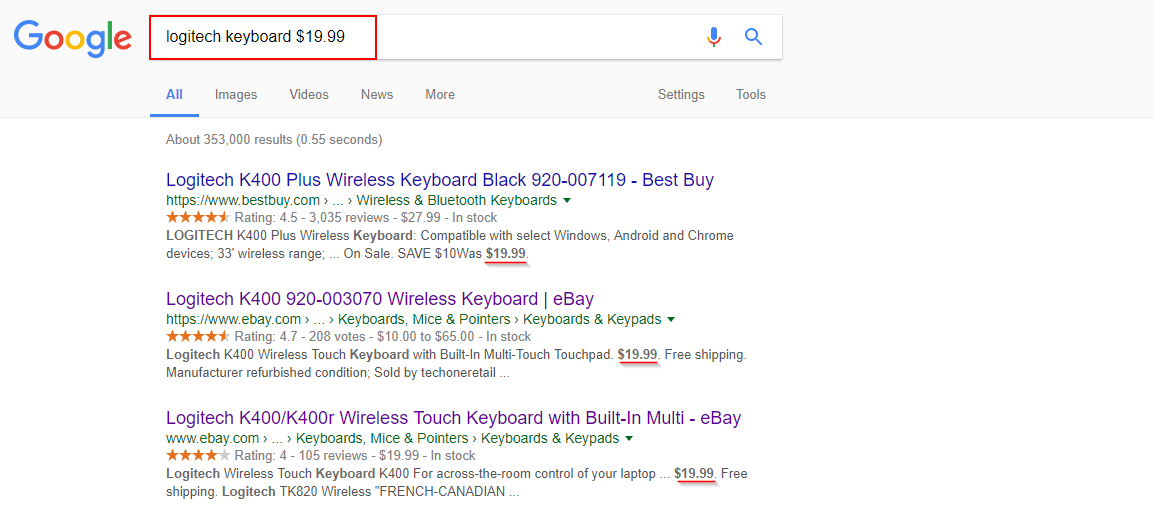
Google Advanced Search Operators
These google advanced operators you need to have at hand working with projects.
Find the desired keyword in the title tag with intitle:
For example, search query seo audit intitle:tools will gather the pages that contain the term "tools" in the page title and contain seo and audit terms anywhere in the web page content.
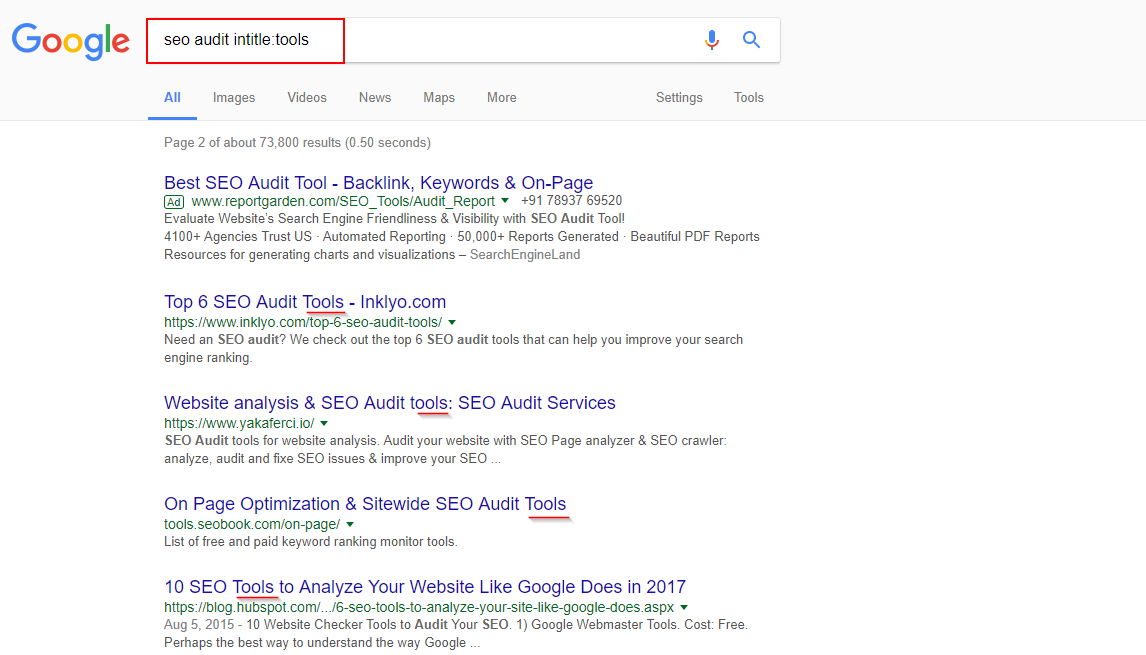
Search for the desired keywords only within title tag with allintitle: operator
Alternatively, you can use intitle operator multiple times. For example, allintitle:seo tool is the same as intitle:seo intitle:tool.
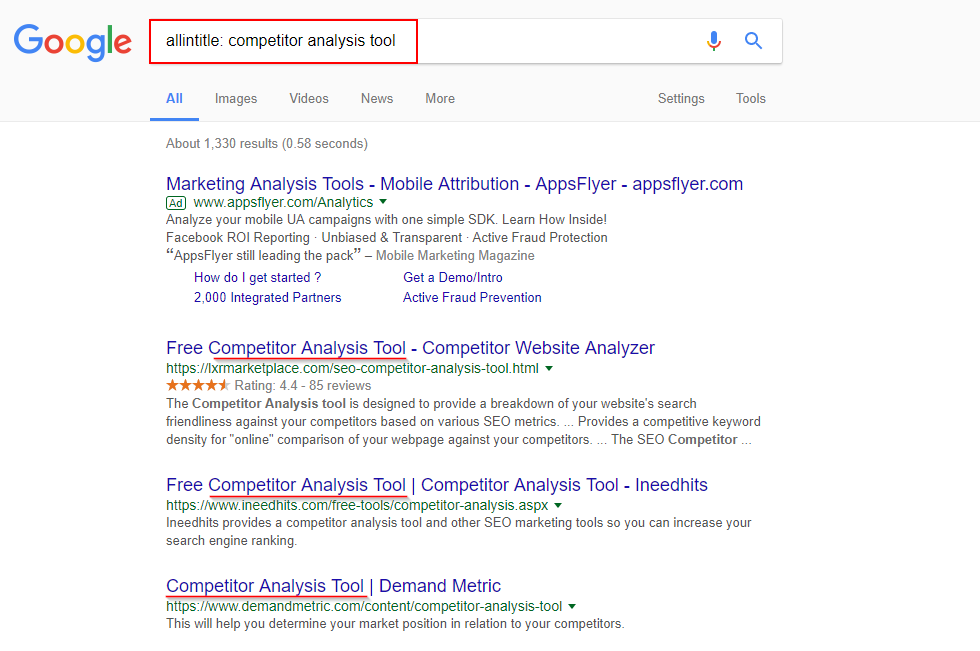
Find the pages that have the desired keyword in the page's URL with inurl:
This is a suffix operator, meaning you should place it at the end of your search query.
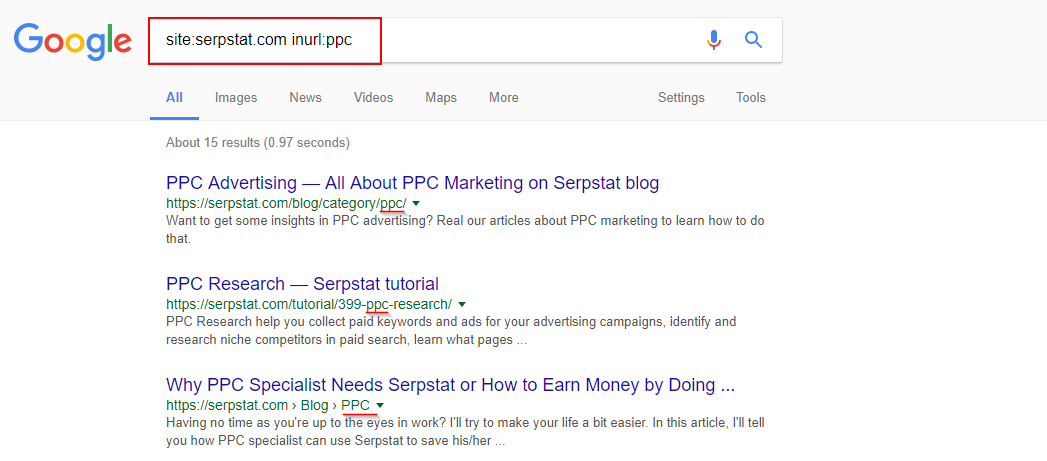
Search for several keywords within pages' URLs with help of allinurl: operator
For instance, if you search using the term allinurl:content analysis tool, Google search result will show you the web pages that have the terms content, analysis and tool in their URL. Terms can appear anywhere in URL.
Note, that this is also a suffix operator.
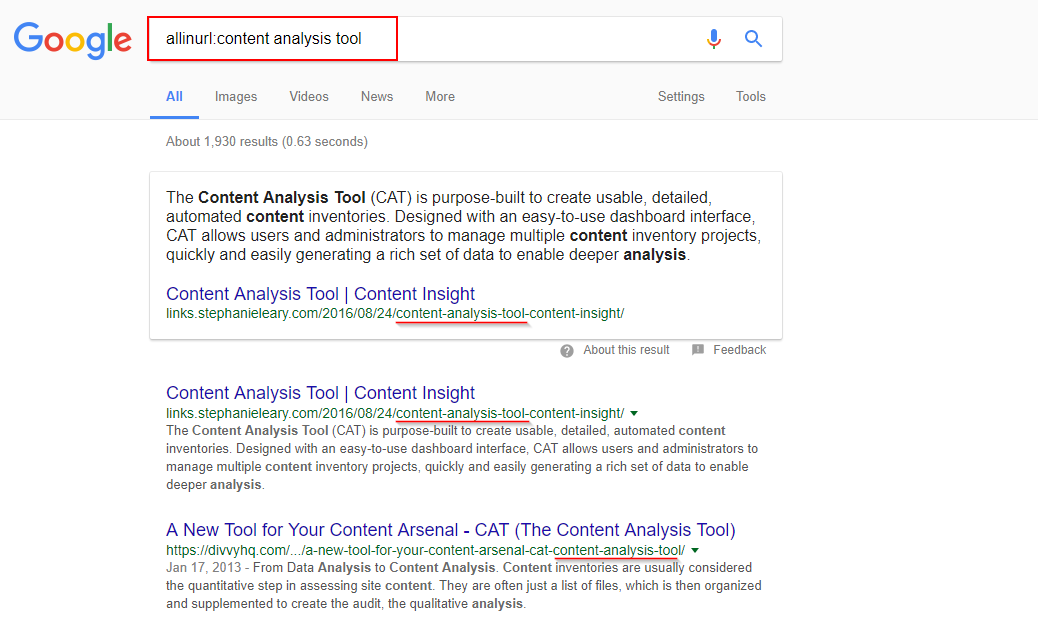
Use intext: to find the pages that include the desired keyword in the body tag
For example, intext:marketing search query will collect all the pages that have the keyword "marketing" in their body text. This operator is different from the " " operator. While putting the phrase in quotes searches for an exact phrase in the whole page content, this operator limits the search to the body content.
Search query intext:keyword analysis tips is different from intext:"keyword analysis tips". The first query will display the results from pages that have the term "keyword" in the body content and terms "analysis" and "tips" anywhere in the web page content. The latter one will show you the list of web pages that have the exact phrase "keyword analysis tips" in body content.
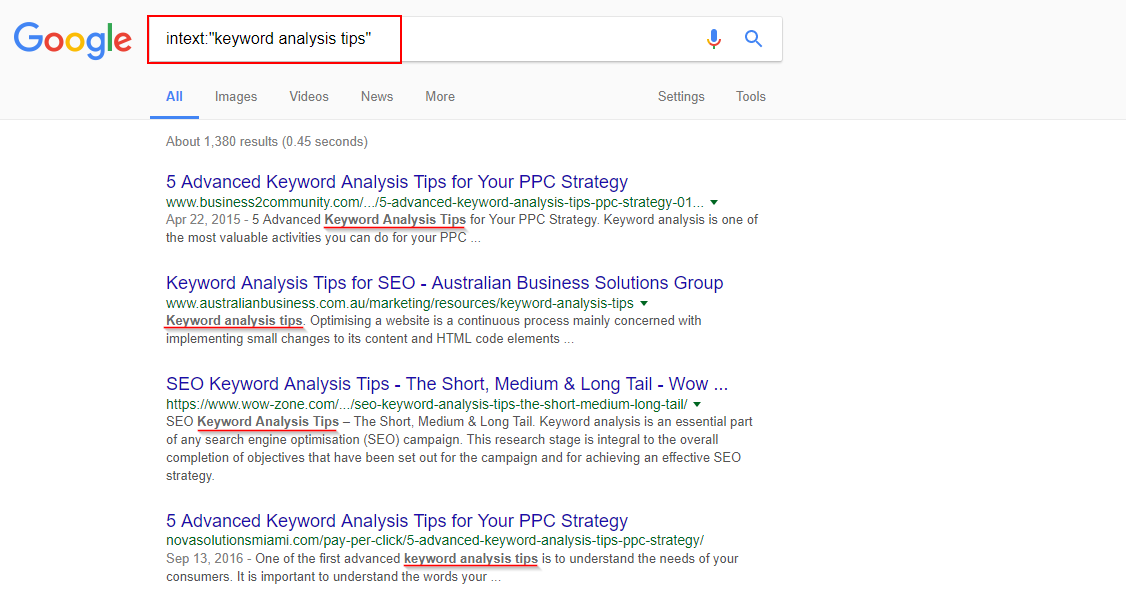
Find the pages with multiple keywords in the body tag with the help of allintext:
For example, search query allintext:keyword analysis tips will provide you with a list of pages that have terms keyword, analysis and tips in the document content section.
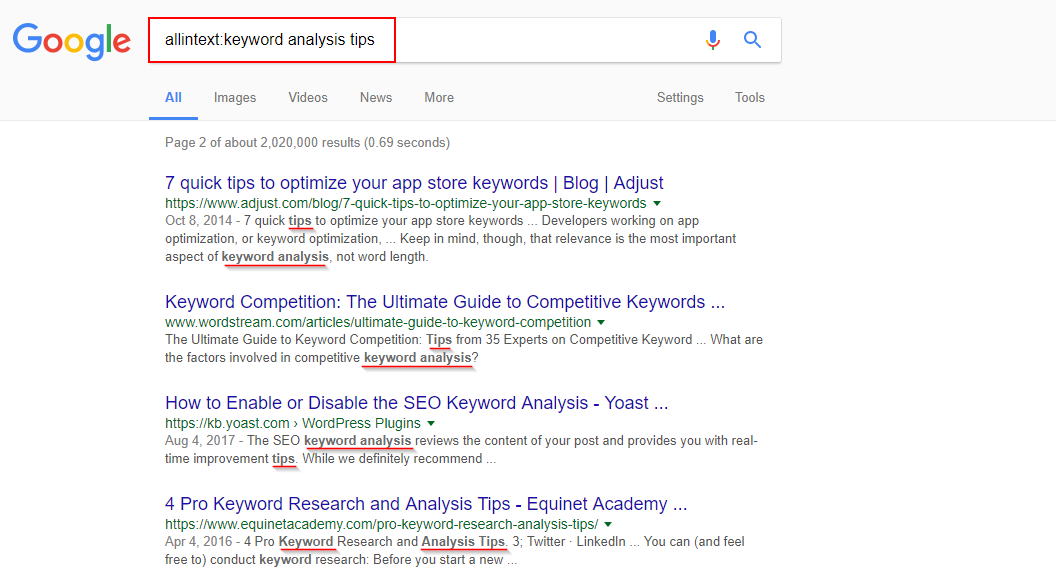
Find just the desired file formats with filetype:
For instance, if you perform a search with the query link building tips filetype:docx, Google search result will include links to all the docx files that are related to link building tips.
If you do not specify file format in search query, the search result will show the links to all the documents related to query term.
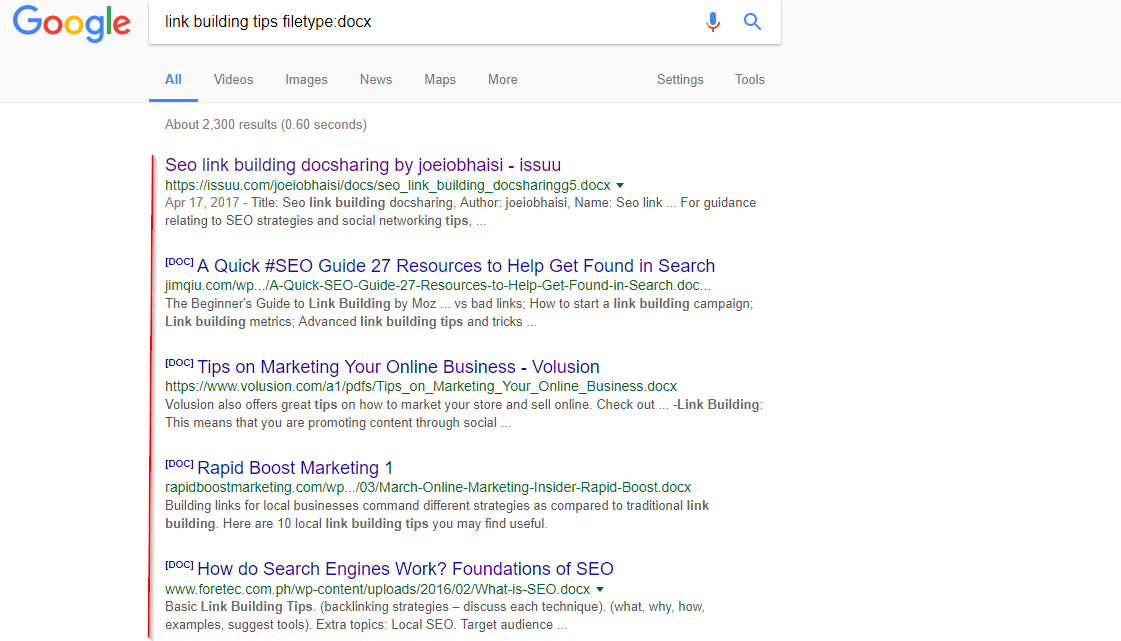
Learn the meaning of the desired word with the help of define: operator
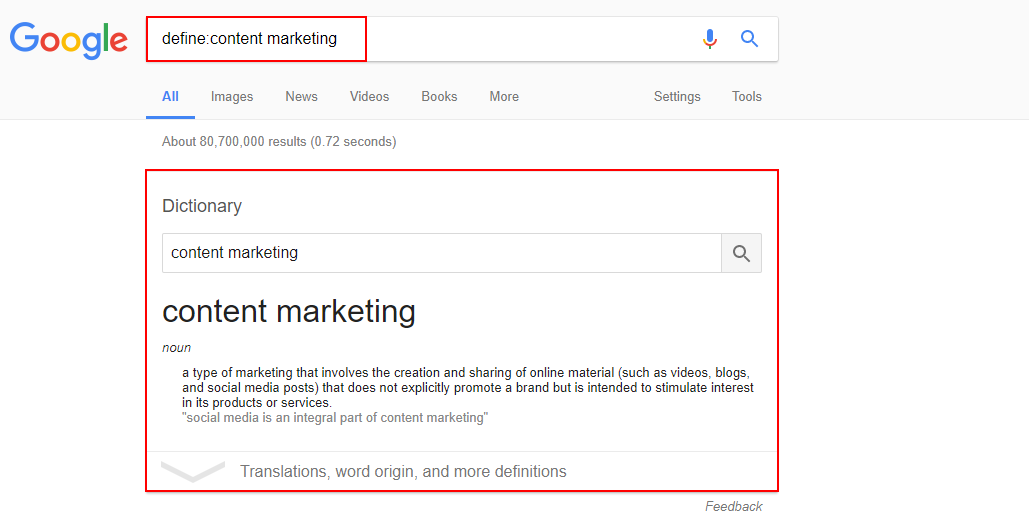
Search within the specific website using source:

Find out the stock price with stock:
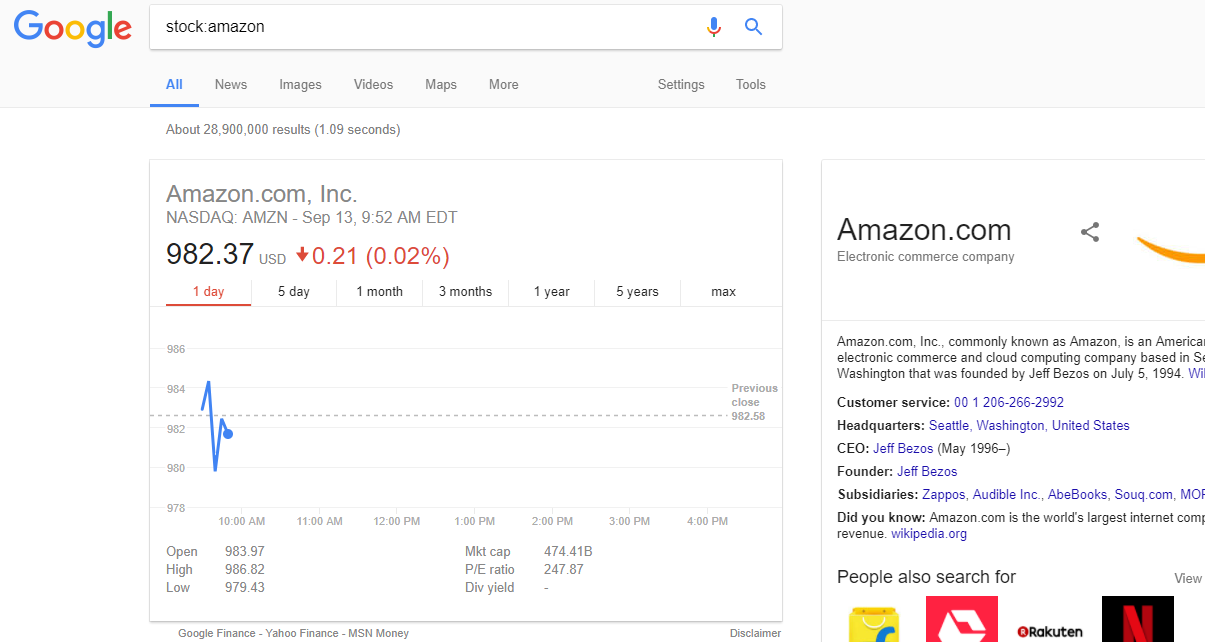
Tips for using Google Search operators
Search within a particular website by using "site:"
For example, for finding everything related to keyword research on serpstart.com, you can use the query site:serpstat.com keyword research.
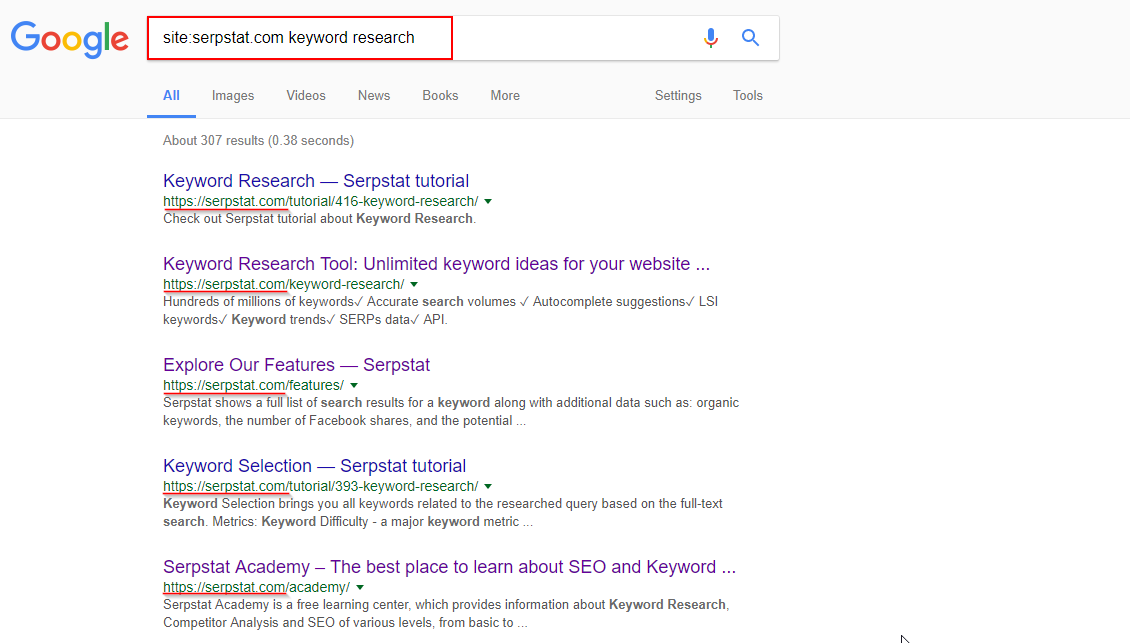
For instance, to search for growth hacking articles blog on Serpstat blog, use the query site:serpstat.com/blog growth hacking.
Use OR operator to see the results that meet one of the specified queries
For instance, intitle:"keyword analysis" OR allinurl:keyword tool query will gather all the web pages that either have "keyword analysis" in the page title, or "keyword" and "tool" in the page URL. You can also use the pipe (|) symbol instead of an OR operator.
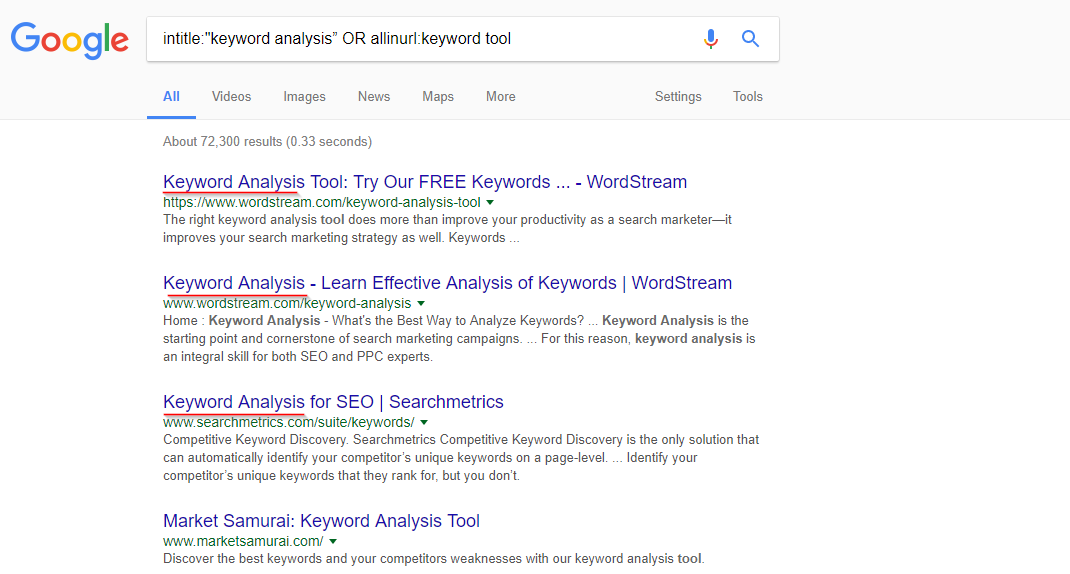
Expand the search results with AND operator
For instance, search query site:serpstat.com AND intitle:seo AND intext:link building, will collect all the pages from website serpstat.com that have term seo in page title and terms link and building in body content.
Always remember to use capital letters for OR and AND operators.
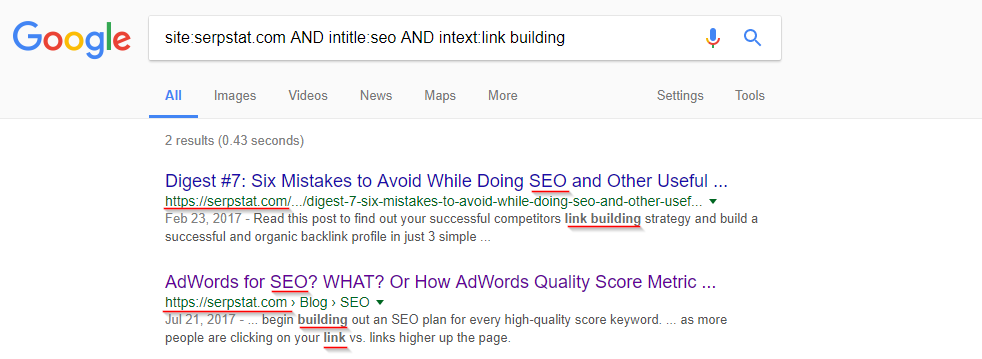
Check when your page was last cached using cache: operator
For instance, if your search query is cache:https://serpstat.com/blog/why-and-how-to-advertise-on-facebook/, Google will show you the cached version of this page as stored by Google. It is quite useful for checking articles that websites have deleted immediately after publishing due to various reasons. In a rare case, it is also helpful for recovering your website content if you do not have a proper backup data, or you've lost control of the website backup data.

Find similar websites with related: operator
The related operator will not work if you combine it with other operators.

Summing up
These operators are boon for any person working in SEO field. You can analyse your competitor, find backlink opportunities, find out about guest posting blogs etc.
It takes practice to get more from these operators, and a little bit of creativity will provide you great advantage over your competitor ;)
FAQ:
How To Use the Search Operator?
First, define the purpose of your search. Second, learn more about basic and advanced operators. Next, choose the operators that will be useful to complete your tasks, combine them and then type your request in the search and compare the results.
Can search operators be combined?
You can combine advanced operators with basics to obtain more results. For example, intitle:"keyword analysis" OR allinurl:keyword tool query will gather all the web pages that either have "keyword analysis" in the page title, or "keyword" and "tool" in the page URL.
Speed up your search marketing growth with Serpstat!
Keyword and backlink opportunities, competitors' online strategy, daily rankings and SEO-related issues.
A pack of tools for reducing your time on SEO tasks.
Discover More SEO Tools
Backlink Cheсker
Backlinks checking for any site. Increase the power of your backlink profile
API for SEO
Search big data and get results using SEO API
Competitor Website Analytics
Complete analysis of competitors' websites for SEO and PPC
Keyword Rank Checker
Google Keyword Rankings Checker - gain valuable insights into your website's search engine rankings
Recommended posts
Cases, life hacks, researches, and useful articles
Don’t you have time to follow the news? No worries! Our editor will choose articles that will definitely help you with your work. Join our cozy community :)
By clicking the button, you agree to our privacy policy.

